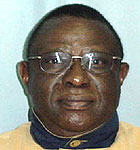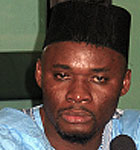 |
| Part of a series on the |
| Rwandan genocide |
|---|
The Musha Church massacre refers to the killing of more than a thousand Tutsi civilians in April 1994 by Interahamwe, a Hutu paramilitary organization.
 |
| Part of a series on the |
| Rwandan genocide |
|---|
The Musha Church massacre refers to the killing of more than a thousand Tutsi civilians in April 1994 by Interahamwe, a Hutu paramilitary organization.
According to the ICTR verdict in the Paul Bisengimana case between the 8 and 13 April 1994, more than a thousand Tutsi civilians sought refuge at Musha Church, situated in Rutoma sector, Gikoro commune, Kigali-Rural préfecture, having fled from attacks against Tutsi civilians occurring throughout the préfecture. On about April 12, 1994, guns and grenades were distributed to Interahamwe militiamen and other armed civilians at Musha Church by members of the Rwandan Army. On about 13 April 1994, an attack was launched against the Tutsi civilians seeking refuge at the church. The attackers used guns, grenades, machetes, pangas and other traditional weapons. This attack resulted in the killing of more than a thousand Tutsi civilians. During the attack, a civilian militiaman named Manda set fire to the church, causing the death of many refugees. [1]

The International Criminal Tribunal for Rwanda was an international court established in November 1994 by the United Nations Security Council in Resolution 955 in order to adjudicate people charged for the Rwandan genocide and other serious violations of international law in Rwanda, or by Rwandan citizens in nearby states, between 1 January and 31 December 1994. The court eventually convicted 61 individuals and acquitted 14.

The Rwandan genocide, also known as the genocide against the Tutsi, occurred between 7 April and 19 July 1994 during the Rwandan Civil War. During this period of around 100 days, members of the Tutsi minority ethnic group, as well as some moderate Hutu and Twa, were killed by armed Hutu militias. Although the Constitution of Rwanda states that more than 1 million people perished in the genocide, the actual number of fatalities is unclear, and some estimates suggest that the real number killed was likely lower. The most widely accepted scholarly estimates are around 500,000 to 800,000 Tutsi deaths.

The Nyarubuye massacre is the name which is given to the killing of an estimated 20,000 civilians on April 15, 1994 at the Nyarubuye Roman Catholic Church in Kibungo Province, 140 km (87 mi) east of the Rwandan capital Kigali. The victims were Tutsis. Men, women, and children were reported to have been indiscriminately killed, with the attackers allegedly using spears, machetes, clubs, hand grenades and automatic weapons. Local Interahamwe, acting in concert with the authorities, used bulldozers to knock down the church building. The militia used machetes and rifles to kill every person who tried to escape.

Théoneste Bagosora was a Rwandan military officer. He was chiefly known for his key role in the 1994 Rwandan genocide for which he was sentenced to life imprisonment by the International Criminal Tribunal for Rwanda (ICTR). In 2011, the sentence was reduced to 35 years' imprisonment on appeal. He was due to be imprisoned until he was 89. According to René Lemarchand, Bagosora was "the chief organizer of the killings". On 25 September 2021, he died in a prison hospital in Mali, where he was being treated for heart issues.

Butare was a province (prefecture) of Rwanda prior to its dissolution in January 2006. Butare city was the second largest city in Rwanda and one of the nation's former twelve provinces. It is located in south-central region of the country and borders Burundi to the south. It had a population of 77.449 as of January 2006.

Pauline Nyiramasuhuko is a Rwandan politician who was the Minister for Family Welfare and the Advancement of Women. She was convicted of having incited troops and militia to carry out rape during the Rwandan genocide of 1994. She was tried for genocide and incitement to rape as part of the "Butare Group" at the International Criminal Tribunal for Rwanda (ICTR) in Arusha, Tanzania. In June 2011, she was convicted of seven charges and sentenced to life imprisonment. Nyiramasuhuko is the first woman to be convicted of genocide by the ICTR, and the first woman to be convicted of genocidal rape.
Simon Bikindi was a Rwandan singer-songwriter who was formerly very popular in Rwanda. His patriotic songs were playlist staples on the national radio station Radio Rwanda during the war from October 1990 to July 1994 before the Rwandan Patriotic Front took power. For actions during the April 1994 genocide against Tutsi, he was tried and convicted for incitement to genocide by the International Criminal Tribunal for Rwanda (ICTR) in 2008. He died of diabetes at a Beninese hospital in late 2018.

Hassan Ngeze is a Rwandan journalist and convicted war criminal best known for spreading anti-Tutsi propaganda and Hutu superiority through his newspaper, Kangura, which he founded in 1990. Ngeze was a founding member and leadership figure in the Coalition for the Defence of the Republic (CDR), a Rwandan Hutu Power political party that is known for helping to incite the genocide.
Nyarubuye is a district (akarere) of the East Province in Rwanda. Its area is 439 km2, and its population in 2002 was 49,565.

The Impuzamugambi was a Hutu militia in Rwanda formed in 1992. Together with the Interahamwe militia, which formed earlier and had more members, the Impuzamugambi was responsible for many of the deaths of Tutsis and moderate Hutus during the Rwandan genocide of 1994.
Augustin Ndindiliyimana is a former Rwandan General and Chief of the Rwandan National Gendarmerie. He was convicted of genocide by the International Criminal Tribunal for Rwanda but he was acquitted by the tribunal upon appeal.

The following is a partial chronology of significant events surrounding the 1994 Rwandan genocide.
Fulgence Kayishema is a Rwandan Hutu militiaman arrested for war crimes in relation to his role in the 1994 Rwandan genocide. Born in Kivumu, he was the inspector of the judicial police there at the time of the genocide. His indictment cites his involvement in massacres from April 6, 1994, until April 20, along with Athanase Seromba, Grégoire Ndahimana, Télesphore Ndungutse, the judge Joseph Habiyambere and the assistant mayor Vedaste Mupende.
Jean de Dieu Kamuhanda is a Rwandan politician who was sentenced to life imprisonment by the International Criminal Tribunal for Rwanda (ICTR) for his role in the 1994 Rwandan Genocide.

Charles Ayodeji Adeogun-Phillips is a former United Nations genocide and war crimes prosecutor, international lawyer and founder of Charles Anthony (Lawyers) LLP.

Jerry Robert Kajuga was national president of the Interahamwe, the group largely responsible for perpetrating the Rwandan genocide against the Tutsi people in 1994. Born to a Tutsi father and a Hutu mother, Kajuga concealed his background and presented himself as being of pure Hutu descent. This is notable as Hutu Power extremist groups considered Hutus who married Tutsis to be race traitors, and Kajuga went to great lengths to conceal his identity.

Kantano Habimana, commonly referred to as Kantano, was a presenter (animateur) on the Rwandan radio station RTLM, which played a significant role in promoting the genocide against the Tutsi. Like the station's other broadcasters, Habimana incited violence against Tutsi and moderate Hutu on the air.
During the Rwandan genocide of 1994, over the course of 100 days, up to half a million women and children were raped, sexually mutilated, or murdered. The International Criminal Tribunal for Rwanda (ICTR) handed down the first conviction for the use of rape as a weapon of war during the civil conflict, and, because the intent of the mass violence against Rwandan women and children was to destroy, in whole or in part, a particular ethnic group, it was the first time that mass rape during wartime was found to be an act of genocidal rape.
Drew White (QC) is an international lawyer from Canada best known for his role in the conviction of Colonel Theoneste Bagosora, who the media dubbed "the mastermind" of the 1994 Rwanda genocide and who White referred to in his closing trial submissions as one of the "enemies of the human race".
Segun Jegede is an international lawyer from Nigeria who has practiced law for over three decades at domestic and international level. A prolific writer and author, Jegede's career highlights comprise his extensive work of over 13 years at the United Nations International Criminal Tribunal for Rwanda (UNICTR), and advocacy work in international criminal law through the Legal Watch and Human Rights Initiative, a registered non-profit organization he co-founded. His work at the UNICTR mainly revolved around the investigation and prosecution of some of the known masterminds of the egregious crimes committed during the Rwandan genocide. His perspectives of the historical events which led to the Rwandan genocide and the ground breaking case law generated by the UNICTR established to prosecute those who bear the greatest responsibility for the genocide are documented in his book, “The Rwandan Genocide: Historical Background and Jurisprudence”. In the book, Jegede provides a riveting account of the pre-genocide history of Rwanda, including the often overlooked elements that make the Rwandan genocide one of the worst human tragedies of our time. Through the cases, in an engaging and candid style, the Author reveals several ground breaking decisions of the UNICTR such as the pronouncement of rape as genocide and the conviction of a woman for rape as a crime against humanity. Jegede serves as a consultant for the International Labour Organization (ILO) on human trafficking issues and the National Human Rights Commission.